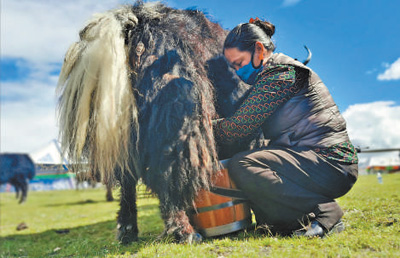

Naqu city in southwest China's Tibet autonomous region has set up animal husbandry cooperatives, as part of the efforts to help local herdsmen shake off poverty.

A herdswoman takes milk from a yak. (Photo/People's Daily)
In early August, in Maidika township, Jiali county, Naqu city, Tibet, local residents walking outdoors still had to be wrapped in cotton-padded clothes. The average elevation here is more than 5,100 meters above sea level, which belongs to the alpine pastoral area.
Dressed in a crimson Tibetan robe and a wide-eave felt hat, Tsanga-pa, a Tibetan man in Kaire village, was in high spirits. With dividends from animal husbandry cooperatives, plus income from small businesses, odd jobs, and grassland ecological subsidies issued by the government, Tsanga-pa's total income last year was nearly 100,000 yuan (about $14,460). Not long ago, he bought a new house in the town.
"The altitude is lower here, and it is convenient for children to go to school." Tsanga-pa said with a smile, "With higher income, the quality of life should also be improved."
However, before 2015, the annual per capita income of the Tsanga-pa's family was only more than 2,000 yuan (less than 300 USD). The change came from the policy of "one village, one cooperative" to promote poverty alleviation implemented in Maidika township.
In 2015, Pasang Tsering served as secretary of the Party committee of Maidika township. At that time, there were 380 poor households and 1,900 people in the township, accounting for 37 percent of the total population. Herdsmen relied mainly on scattered grazing and had a meagre income.
In order to develop the local industry, Pasang Tsering encouraged and supported the establishment of economic cooperation organizations in various villages, while also organizing labor training courses and driving training courses for herdsmen. Over the past few years, cooperatives have been set up in every village in the township, and 20 economic cooperation organizations have been established, such as cow dung processing plants, domestic service centers, oil and gas stations.
In 2017, when the Kaige ranch cooperative was established, Tsanga-pa joined the cooperative along with his wife and all 18 yaks in the family. Over the past two years, Tsanga-pa's family received not only 12,800 yuan in dividends from the ranch, but also a heifer. Since he doesn't have to graze by himself, Tsanga-pa can take the time to go out to work. In the past two years, the income has increased several times over. Today, like Tsanga-pa, all of the poor households in Maidika have been lifted out of poverty.
"Through continuous progress over the past few years, the number of agricultural and animal husbandry cooperatives in Naqu city has reached 1,540, covering 73,500 farmers and herdsmen and 322,900 people," said Ao Liuquan, secretary of the Naqu municipal CPC committee.
 Fire brigade in Shanghai holds group wedding
Fire brigade in Shanghai holds group wedding Tourists enjoy ice sculptures in Datan Town, north China
Tourists enjoy ice sculptures in Datan Town, north China Sunset scenery of Dayan Pagoda in Xi'an
Sunset scenery of Dayan Pagoda in Xi'an Tourists have fun at scenic spot in Nanlong Town, NW China
Tourists have fun at scenic spot in Nanlong Town, NW China Harbin attracts tourists by making best use of ice in winter
Harbin attracts tourists by making best use of ice in winter In pics: FIS Alpine Ski Women's World Cup Slalom
In pics: FIS Alpine Ski Women's World Cup Slalom Black-necked cranes rest at reservoir in Lhunzhub County, Lhasa
Black-necked cranes rest at reservoir in Lhunzhub County, Lhasa China's FAST telescope will be available to foreign scientists in April
China's FAST telescope will be available to foreign scientists in April "She power" plays indispensable role in poverty alleviation
"She power" plays indispensable role in poverty alleviation Top 10 world news events of People's Daily in 2020
Top 10 world news events of People's Daily in 2020 Top 10 China news events of People's Daily in 2020
Top 10 China news events of People's Daily in 2020 Top 10 media buzzwords of 2020
Top 10 media buzzwords of 2020 Year-ender:10 major tourism stories of 2020
Year-ender:10 major tourism stories of 2020 No interference in Venezuelan issues
No interference in Venezuelan issues
 Biz prepares for trade spat
Biz prepares for trade spat
 Broadcasting Continent
Broadcasting Continent Australia wins Chinese CEOs as US loses
Australia wins Chinese CEOs as US loses